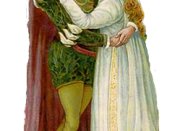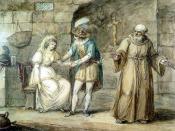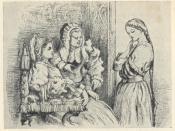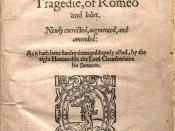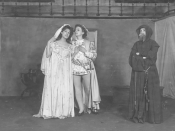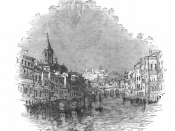In William ShakespeareÃÂs Romeo and Juliet, Friar Lawrence attempts to end their familyÃÂs feuding, although his short-sighted decisions lead to the deaths of Romeo and Juliet. There are four major parts that lead to the death of Romeo and Juliet, all in which Friar Lawrence is indirectly involved. He plays a crucial role in the marriage, the plan for Romeo to go to Mantua, the potion that was given to Juliet and the inevitable deaths that struck both families. His attempts to do the right thing were noble, but because of poor planning, they soon lead to the fate of two ÃÂstar-crossed loversÃÂ (Prologue 6). Although Friar Lawrence has good intentions, his actions lead to the playÃÂs tragedy.
Friar LawrenceÃÂs actions demonstrate that he acts for the ÃÂgreater goodÃÂ of others. ÃÂTo turn your householdsÃÂ rancor to pure loveÃÂ (2.3.98-99), Friar Lawrence risks his own reputation by marrying Romeo and Juliet.
The friar even warns Romeo that ÃÂThey stumble that run fastÃÂ (2.4.101). Only married for a few hours, Romeo kills Tybalt and is banished to Mantua, hampering him from seeing Juliet. Because of RomeoÃÂs actions, he completely ruins his chances of ending the feuding. He cries with anguish and talks about suicide to Friar Lawrence. Friar LawrenceÃÂs plan is then destroyed. Therefore, attempting to stop Romeo from killing himself, he creates a new plan for Romeo to accept his banishment. The friar advises Romeo to reside in Mantua for a period of time until the families accept the marriage. This plan could work expect that Capulet insists that Juliet marry Paris to relieve her grief. To cover up his mistakes, Friar Lawrence creates a potion that will make Juliet appear dead. He believes that the Capulets will pronounce Juliet dead, Romeo will rescue her from the Capulet tomb and they will flee to Mantua. Friar Lawrence thinks that after a period of time, when Romeo and Juliet return, the Capulets will be so happy that their daughter is alive and will accept Romeo as her husband. Friar LawrenceÃÂs plans are well meaning and demonstrate his desire to provide peace to Verona.
Although Friar Lawrence could not control the outcome of events, his actions lead to tragic consequences. After Juliet is informed that she will marry Paris, she consults the friar, who tries to resolve this problem. Not knowing if the potion will work, he gives it to her, so it will appear as she is dead. He tells Juliet she must drink the potion the next day, however he has not made sure that Friar John delivered the message and Romeo knows of the plan. If the message had reached Romeo in time, he would not have murdered Paris, purchased a poison to commit suicide, and Juliet would not have also committed suicide. Friar Lawrence shows even more irresponsibility when he leaves Juliet at the tomb. Hearing the watchmen approaching, he leaves Juliet there. He cares more for his wellbeing than protecting Juliet. Knowing that Juliet has had previous suicidal thoughts, his negligence to take action causes her unfortunate death. Even if all of these plans would have worked, they probably wouldnÃÂt have solved the feud. Capulet would have had the marriage annulled and that would have caused further trouble. Friar Lawrence does not consider the all the possible outcomes of his plans. The FriarÃÂs intentions are well, but he has not carefully considered the course that his actions will take.
Even though Friar LawrenceÃÂs many complex plans failed, he should not be condemned for his well meaning actions. Regardless of his many short sighted decisions, which eventually led to tragedy, he acts in the best interests of the people of Verona and the two families.
BibliographyWilliam, Shakespeare,. The Tragedy of Romeo and Juliet. New York: Pocket Books, 1992.
